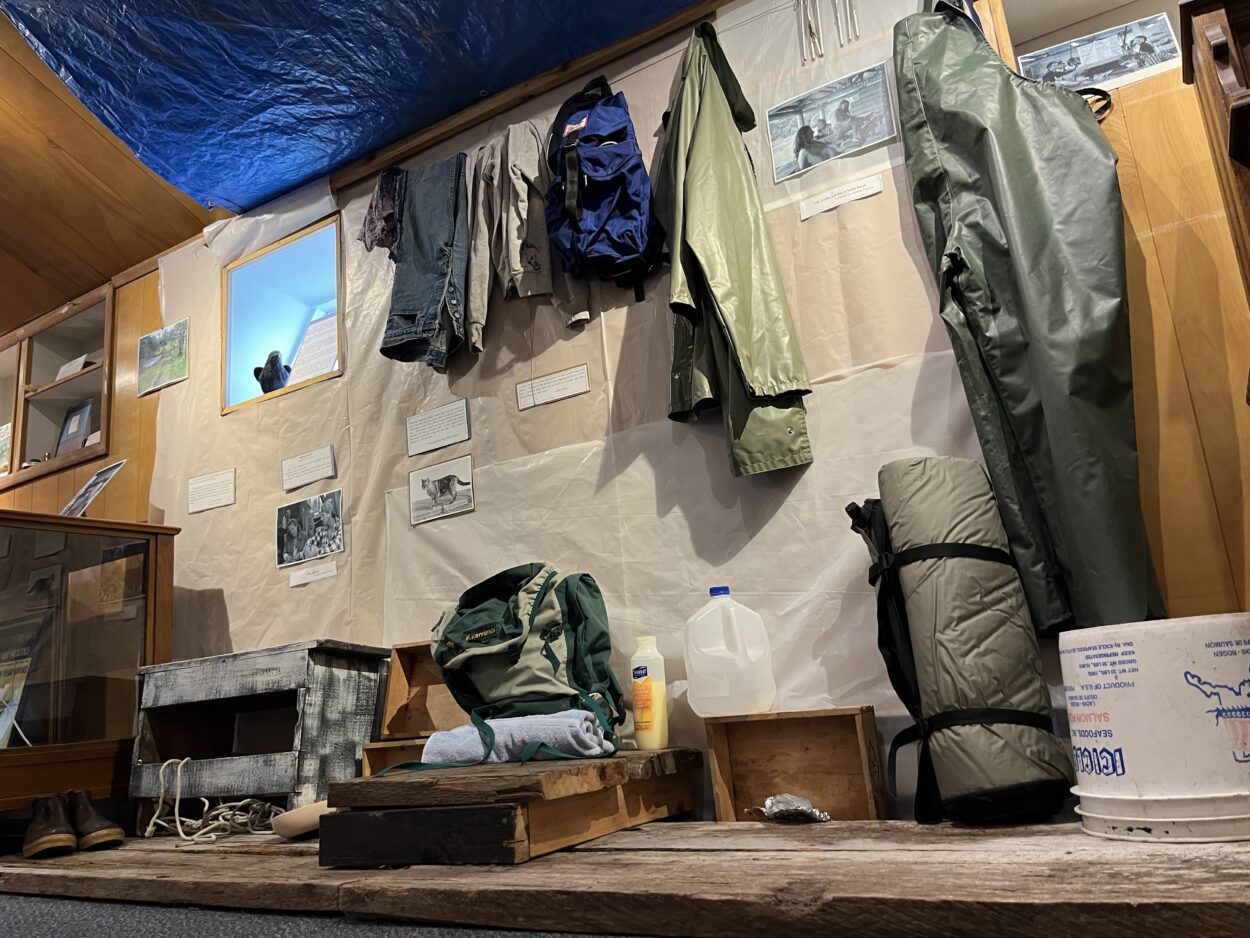
For decades, Petersburg’s aptly-named Tent City provided shelter for a rotating cast of transient workers and adventurers. Some of them stayed in Petersburg and ended up making it their permanent home. A new exhibit at the Clausen Memorial Museum looks at the ways that the campground impacted both the economy and the character of the town.
Sled dog Louie comes through the gate, ready to race around looping gravel trails. Nearby, another dog Ozzie, nuzzles skunk cabbage. We’re more than a mile and a half from downtown Petersburg, at a fenced dog park run by Petersburg’s Humane Association.
But this place wasn’t always a park. In the ’80s and ’90s, it was a campground, known as Tent City. The economy of Petersburg has long relied on fish. But before fish processing plants had bunkhouses for their employees, cannery workers had a tough time finding lodging during the fishing season. In 1980, the city of Petersburg decided to address the housing problem by building 26 tent platforms, restrooms, and a cooking pavilion on a chunk of land between Sandy Beach and the airport. A month after the campground opened in the summer of 1981, it was full. Heidi Lee lived in a school bus just down the hill from Tent City.
“So many people came here from all over the world, and had a big experience,” she said.
The museum exhibit takes visitors on a tour through the 20 plus years of Tent City’s existence. A blue tarp hangs from the ceiling, mimicking the shelters built on each tent platform. There are photos of campers of course, but also the camp cat, named The Mayor of Tent City. There’s a bunch of silverware, found under the tent platforms when the campground was dismantled. Another common find? Ear plugs. Don Perry managed the campground in the late ’90s.
“There’s somebody asleep, depending upon what shifts they’re on,” he said. “Every minute of the day, there’s people in there sleeping, because some work days, some work nights.”
The campground had its own culture, one that was a little more wild and woolly than that of Petersburg. Don Perry says that although not everyone at Tent City was wonderful — it was filled with all kinds — he loved the job of managing the campground.
“It was fun,” he said. “And it’s the people that made it fun. It wasn’t me. It just wasn’t me, but they made it fun.”
He tells a story about a man from New York who was a little out of his element. He came to Petersburg to work for PFI. The processing plant had donated a sleeping bag for him to use at the campground.
“‘[The guy said] ‘What do I do with this?’ ‘Do I lay on top of it, do I lay under it?” said Perry. “I says, well you just unzip ‘n’ you crawl in it. And I unzipped it for him and he crawled in it. It was amazing how many people out there that had never slept in a sleeping bag.”
The constant rain made Tent City life soggy. Hours at the cannery were long. Those unwilling to hitchhike or pay cab fare into town often had to walk or bike to and from work in bad weather. In the late ’90s, processing plants started to build bunkhouses for their employees. By the early 2000s, Tent City was no longer financially viable, and in 2003 the Petersburg City Council voted unanimously to close the campground. After laying vacant for nearly a decade, the Borough voted to give the Petersburg Humane Association permission to use the land. Heidi Lee loves that the museum has an exhibit focusing on the campground.
“It was our kind of more recent history of people moving to town and discovering this place and realizing, you know, what a gem it is,” she said. “It’s fun to see people fall in love with this place, because it gives us new appreciation for it, you know?”
Outgoing Museum Director Cindi Lagoudakis says the exhibit has helped her understand just how much Tent City was a part of life in Petersburg during the ’80s and ’90s.
“Everybody who comes in the door has a story of their own to tell, which is really kind of fun,” said Loudakis. “Some aspect of it that they know about, or they experienced. And that’s that’s kind of what a museum is about. You know, it’s to share information to share history to make you think, to kind of have something that you can relate to. So this is perfect.”
Items continue to be added to the exhibit which will be up through the end of the summer. Those who would like to share photos or other relics of the Tent City days are encouraged to bring them to the museum.











